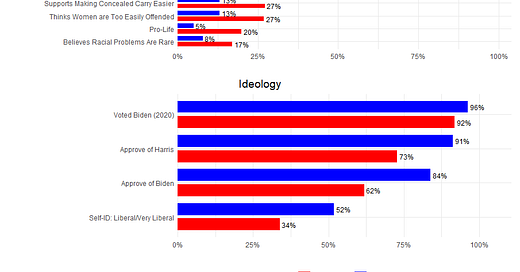The Democrats' 2024 No-Show Problem
Who were the Democrats that sat out the 2024 election, and what might it mean for the party going forward?
In the aftermath of the 2024 election, different factions within the Democratic party pointed in opposite directions to explain the party’s historic defeat: some blamed the loss on progressive overreach that alienated swing voters, while others argued the party failed to inspire its base with a bold progressive policy pitch. But as CWCP Director Jared Abbott and Research Associate Dustin “Dino” Guastella show in a recent Nation article, new data from the Cooperative Election Study (CES) complicates both narratives.
Their analysis finds that Democratic nonvoters were, in general, less progressive than Democrats who voted. Nonvoting Democrats’, for example, were more likely to favor expanding fossil fuel production and stricter border enforcement, and less likely to support policies like sending aid to Gaza. “Contrary to what left-wing optimists had hoped,” the authors write, “Democratic nonvoters in 2024 appear to have been less progressive than Democrats who voted.”
But the differences were not uniform across all issues. Nonvoting Democrats still expressed strong support for a number of progressive positions on social issues—particularly around issues like gun control and racial discrimination. Most supported banning assault rifles and agreed that racism remains a serious problem in the United States, even if their support was somewhat lower than among voters.
In turn, Democratic nonvoters were firmly aligned with progressive economic policy in key areas. Large majorities backed raising corporate taxes, expanding Medicaid, and increasing state investment in infrastructure. While their support for these policies was often somewhat lower than that of their voting counterparts, it remained overwhelmingly positive. And these results, Abbott and Guastella emphasize, are “consistent with a range of other survey evidence that has shown that working-class Americans…are solidly in favor of a wide range of progressive economic policies, including some that fall well to the left of mainstream of Democrats’ economic policy proposals...”
Abbott and Guastella find further that non-voting Democrats were disproportionately working-class, economically insecure, and non-white. They were more likely to report low incomes, lack college degrees, work in unstable or gig-based jobs, and say their financial situation had declined over the past year. Many also expressed support for increased state welfare spending. Viewed in that context, their economic preferences appear grounded less in ideology than in a desire to address immediate material needs.
The data don’t offer a simple fix. There’s little to suggest that a more aggressively progressive message would have brought these voters to the polls. But it’s also unclear if moderation in certain areas would have helped to solve the problem. What the data do suggest is that Democrats need a strategy that is grounded in bread-and-butter economic concerns and that meets the realities of an ideologically diverse, economically precarious electorate.
As the authors conclude, “Democrats need to persuade nonvoters with a clear and credible message about how the party plans to improve the economic lives of working people.”
The voters who stayed home in 2024 haven’t disappeared. Whether they show up next time may depend on whether Democrats give them a reason to do so.
.



